
-
Find the right food for your petTake this quiz to see which food may be the best for your furry friend.Find the right food for your petTake this quiz to see which food may be the best for your furry friend.Featured products
 Perfect Weight Small & Mini Adult Dog Food
Perfect Weight Small & Mini Adult Dog FoodHill's Science Plan Adult Small & Mini Dog Food with Turkey is a complete premium pet food for adult small dogs from 1 year old that are prone to weight gain or slightly overweight. This deliciously smooth mousse is formulated to deliver the appropriate amount of energy to support weight maintenance in adult dogs.
Shop Now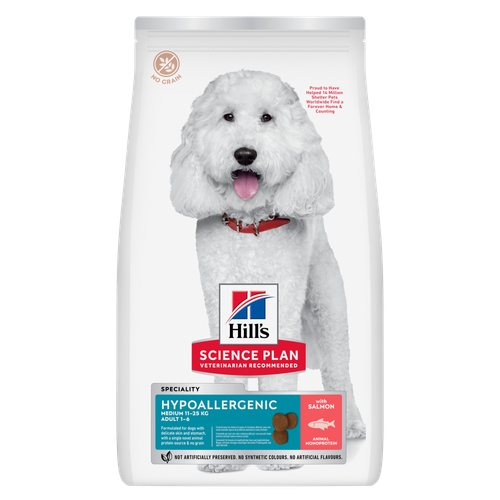 Hypoallergenic Medium Adult Dog Food
Hypoallergenic Medium Adult Dog FoodScience Plan Hypoallergenic Medium Adult dog food with Salmon is a gentle, science-led formula crafted for dogs with food sensitivities. Made with carefully selected, high-quality novel proteins and no grains, it’s tailored to minimise common triggers that can lead to skin and digestive discomfort.
Shop Now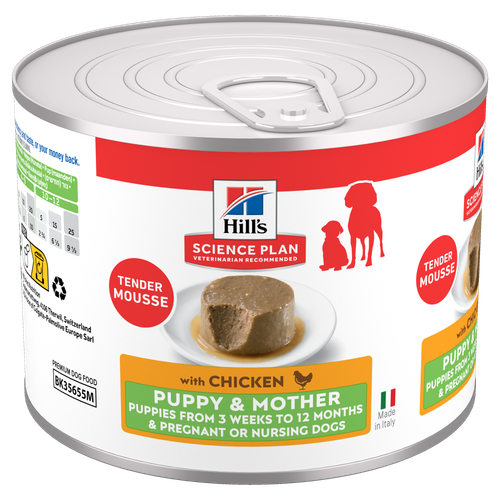 Puppy & Mother Tender Mousse Dog Food
Puppy & Mother Tender Mousse Dog FoodHill's Science Plan Puppy & Mother Tender Mousse Dog Food with Chicken is a complete premium pet food for puppies and pregnant or nursing dogs. Formulated with chicken and other specially selected ingredients, including minerals and antioxidants to support gut health and optimal growth, it comes in a soft mousse texture they'll love.
Shop NowFeatured products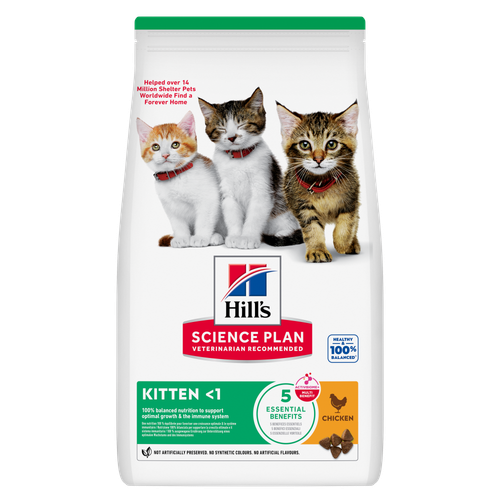 Kitten Food
Kitten FoodHill's Science Plan Sterilised Kitten Cat Food with Chicken is specially formulated with ActivBiome+ Multi-Benefit Technology. This food is carefully formulated for the developmental needs of kittens, so they get the best start in life & grow to their full potential.
Shop Now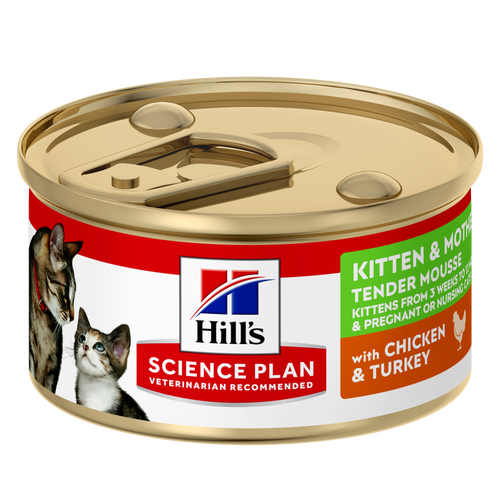 Kitten & Mother Tender Mousse Cat Food
Kitten & Mother Tender Mousse Cat FoodHill's Science Plan Kitten & Mother Tender Mousse Cat Food with Chicken & Turkey is a complete premium pet food for kittens from weaning until 1 year old and for pregnant and nursing cats. Formulated with chicken, turkey and other specially selected ingredients to support gut health and optimal growth. It comes in a soft mousse texture they'll love.
Shop Now Hypoallergenic Dry Cat Food
Hypoallergenic Dry Cat FoodHILL'S SCIENCE PLAN Hypoallergenic Adult cat food with egg & insect protein is a complete pet food for adult cat 1–6 years old. It's formulated for cats with delicate skin and stomach, with limited high quality novel protein sources & no grain.
Shop Now -
Dog
- Dog Tips & Articles
-
Health Category
- Weight
- Food & Environmental Sensitivities
- Urinary
- Digestive
- Joint
- Kidney
-
Life Stage
- Puppy Nutrition
- Adult Nutrition
- Senior Nutrition
Cat- Cat Tips & Articles
-
Health Category
- Weight
- Skin & Food Sensitivities
- Urinary
- Digestive
- Kidney
-
Life Stage
- Kitten Nutrition
- Adult Nutrition
Featured articles Tips For Mixing Wet And Dry Pet Food
Tips For Mixing Wet And Dry Pet FoodDiscover tips for mixing wet and dry pet food to ensure balanced nutrition and variety for your pet. For comprehensive feeding advice, visit Hill's Pet UK.
Read MoreTips for Working From Home With a PetGet helpful information on how to get all of your work done while keeping your dog or cat entertained when working from home.
Read More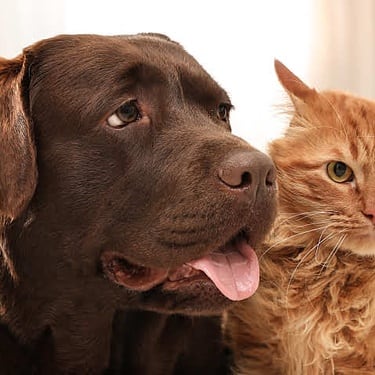 What Cleaning Products Are Safe for Pets?
What Cleaning Products Are Safe for Pets?Learn which cleaning product ingredients can be hazardous for dogs & cats, which alternatives are safer and tips for using cleaning products around pets.
Read More -


The best way to care for your cat’s health and wellbeing is to understand how their body functions and what to look out for when they’re sick. Here's what you need to know about lymphoma in cats so you can be the most informed pet parent you can be.
Lymphoma in Cats
Lymphoma in cats is a cancer of the lymphatic system, which is a collection of lymphocytes (blood cells) and organs (lymph nodes, etc.). It can affect many systems in a cat's body, and is the most common cause of spinal cord tumours.
According to The Royal Veterinary College, feline lymphoma is the most commonly diagnosed cancer in cats. There are many types of lymphoma in cats, but the most common is intestinal lymphoma, also known as gastrointestinal (GI) or alimentary lymphoma. A variety of factors will determine how this cancer might affect your cat.
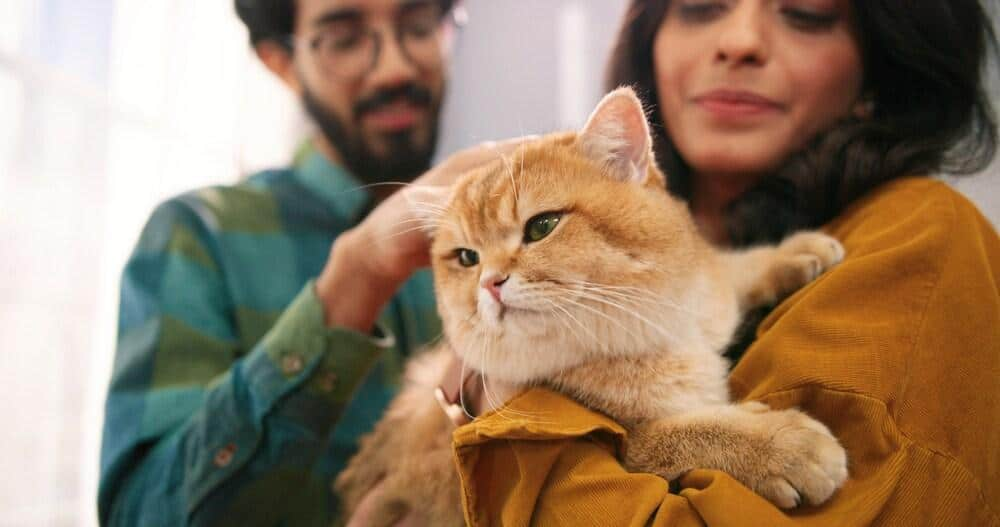
Causes
The onset of feline lymphoma has been linked to the feline leukaemia virus (FeLV), and, to a lesser extent, feline immunodeficiency virus (FIV). Cats who are positive for feline leukaemia generally develop cancer at a younger age. These days, because many cats are housed indoors and there's widespread testing for and vaccination against FeLV, lymphoma is less common in younger cats. Cats who are negative for the virus tend to develop lymphoma at an older age.
Blue Cross says that exposure to tobacco smoke may increase the risk of lymphoma in cats. They explain that, while secondhand smoke may be harmful to all pets, cats are especially vulnerable. Not only do they breathe in smoke from the air, but while self-grooming, they may also ingest toxic particles from smoke that has settled on their fur.
Types of Lymphoma in Cats
Because the lymphatic system interacts with every system in the body, lymphoma can affect any of these organs. The main types of lymphoma include:
- Alimentary (digestive tract)
- Mediastinal (chest)
- Renal (kidneys)
- Nasal (nose)
- Spinal (spine)
- Cutaneous (skin)
- Multicentric (meaning multiple organs are affected, most often the spleen and liver)
Signs of Lymphoma in Cats
Signs of lymphoma in cats depend on which organs are affected. Here are some of the signs to look out for according to where the lymphoma is located:
- Digestive tract: Vomiting, diarrhoea, constipation, loss of appetite, weight loss, lethargy and bloody stool.
- Chest: Open-mouth breathing, coughing, loss of appetite, weight loss and regurgitation.
- Kidneys: Increased drinking and urinating, weight loss and loss of appetite.
- Nose: Chronic nasal discharge, bloody nose, swollen nose, sneezing, loss of appetite, eye discharge and noisy breathing.
- Spine: Weakness or paralysis of the back legs.
- Skin: Itching, hair loss and bleeding skin tumours.
If you notice any of these signs in your cat, immediately contact your veterinarian. They can diagnose your cat's condition and determine the best treatment.
Diagnosis
Lymphoma is diagnosed using a combination of information. If your vet suspects your cat has lymphoma, they'll ask you about your cat's history and lifestyle. They'll likely follow up with a physical examination of your cat, laboratory testing (including blood tests, urinalysis, and testing for FeLV and FIV) and imaging studies, such as radiographs and ultrasounds.


Tasty Tips
The testing your vet recommends will vary depending on the type of lymphoma they suspect. If there's a mass or swollen lymph node, for example, they may also take a biopsy. This involved taking a small sample of the affected tissue and examining it for cancerous cells.
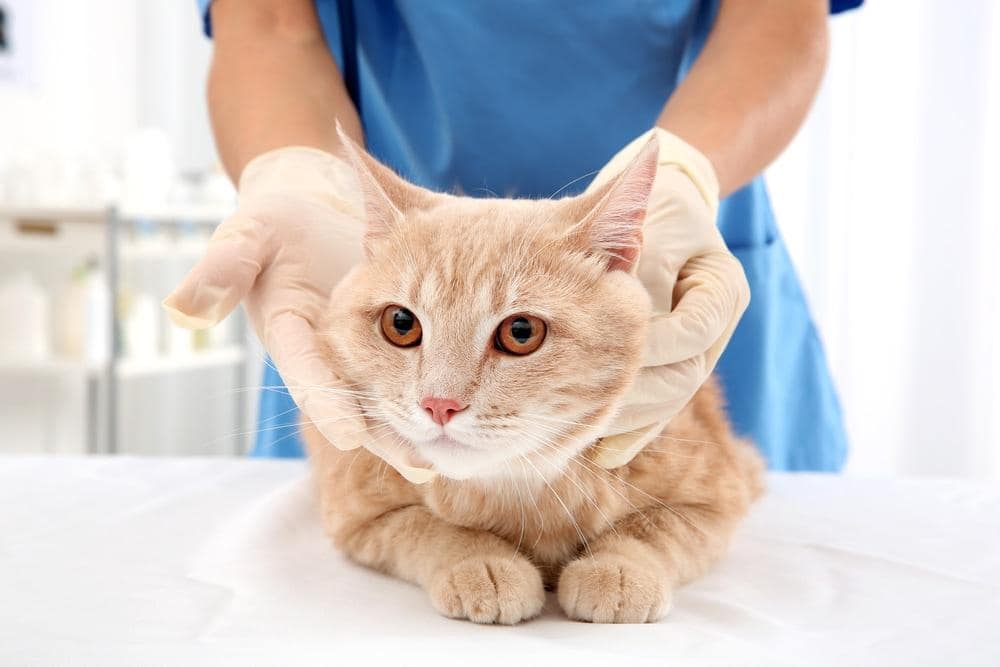
Treatment
Feline lymphoma treatment is aimed at putting the cancer into remission (eliminating all signs and symptoms) and maximising your cat’s quality of life for as long as possible. Because lymphoma is usually widespread in the body, explains Blue Cross, chemotherapy tends to be the preferred option rather than surgery. Cats tend to respond well to this treatment and don’t experience the unpleasant side effects humans do, such as hair loss or nausea.
If chemotherapy isn't an option, your vet may recommend radiation and, in rare cases, surgery. Cats may also receive treatments such as prednisone (a steroid) to relieve the symptoms of cancer.
Prognosis
With chemotherapy, many cats can achieve temporary remission of clinical signs and maintain a good quality of life. Some cats can achieve cancer remission for up to several years, depending on their individual situation. However, prognosis will vary depending on the type of lymphoma, whether your cat is positive for FeLV and/or FIV, and where the cancer is located. Cats who are FeLV- or FIV-positive often have a worse prognosis.
Pet parents should also consult their vet about nutritional requirements for cats with lymphoma.
Prevention
While there's no way to prevent lymphoma, you can take actions to lessen your cat's chances of developing it.
Keep your cat indoors
This will prevent them from having contact with cats who are FeLV- or FIV-positive.
Test for FIV and FeLV
Have your cat tested when they're a kitten if possible. If you're adding a new cat to your household, have them tested before exposing your cat to them.
Vaccinate kittens against FeLV
There is currently no FIV vaccine, but you can have your cat vaccinated for FeLV. If your cat goes outdoors, be sure to keep their FeLV vaccine up to date.
Keep your cat's environment smoke-free
Secondhand smoke is not good for anyone, and according to the Blue Cross, that includes cats.
Visit your vet regularly
Early detection is key. Get your cat examined twice a year and request annual blood tests for cats 7 years and older.
Advances in medicine and better education for pet parents continue to improve the odds for cats with cancer. From early detection to reducing risk factors, you can take steps to help your cat live their best life.


Dr. Sarah Wooten graduated from UC Davis School of Veterinary Medicine in 2002. A member of the American Society of Veterinary Journalists, Dr. Wooten divides her professional time between small animal practice in Greeley, Colorado, public speaking on associate issues, leadership, and client communication, and writing. She enjoys camping with her family, skiing, SCUBA, and participating in triathlons.
Related products

Hill's Science Plan Sterilised Kitten Cat Food with Chicken is specially formulated with ActivBiome+ Multi-Benefit Technology. This food is carefully formulated for the developmental needs of kittens, so they get the best start in life & grow to their full potential.
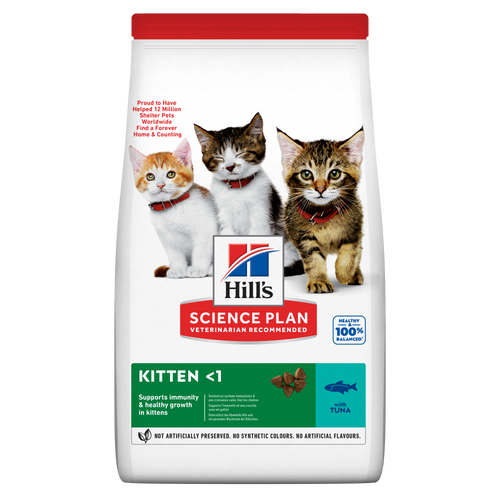
Hill's Science Plan Sterilised Kitten Cat Food with Salmon is specially formulated with ActivBiome+ Multi-Benefit Technology. This food is carefully formulated for the developmental needs of kittens, so they get the best start in life & grow to their full potential.

Hill's Science Plan Kitten & Mother Tender Mousse Cat Food with Chicken & Turkey is a complete premium pet food for kittens from weaning until 1 year old and for pregnant and nursing cats. Formulated with chicken, turkey and other specially selected ingredients to support gut health and optimal growth. It comes in a soft mousse texture they'll love.

HILL'S SCIENCE PLAN Hypoallergenic Adult cat food with egg & insect protein is a complete pet food for adult cat 1–6 years old. It's formulated for cats with delicate skin and stomach, with limited high quality novel protein sources & no grain.
Related articles
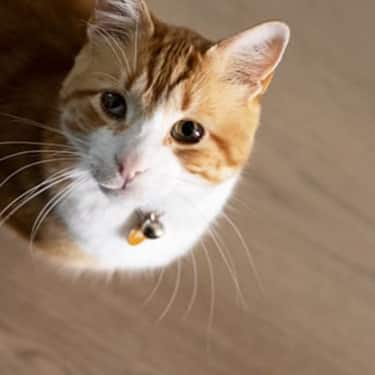
Learn how to spot the signs of a skin condition in your cat and the steps to take for their wellbeing. For comprehensive care advice, visit Hill's Pet.

While hairballs are a common occurrence of cats, there are steps you can take to help them manage their problem and keep them healthy.
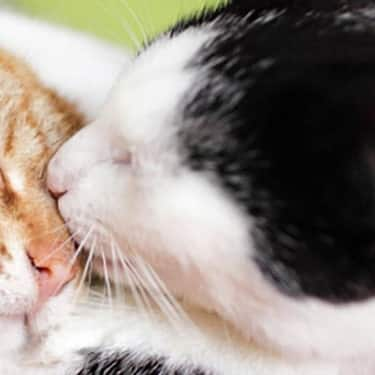
Learn the different factors that might be contributing to your cat's weight gain, and how bigger doesn't always mean better.
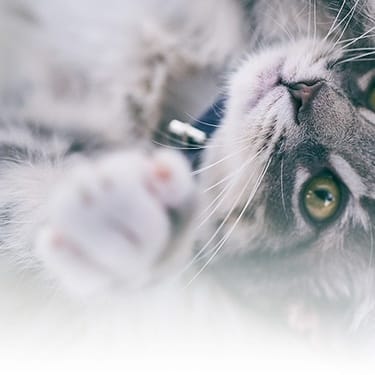
South African vets say more than half the patients they see are overweight. Learn more about managing your cat’s weight.

Put your cat on a diet without them knowing
Our low calorie formula helps you control your cat's weight. It's packed with high-quality protein for building lean muscles, and made with purposeful ingredients for a flavorful, nutritious meal. Clinically proven antioxidants, Vitamin C+E, help promote a healthy immune system.
Put your cat on a diet without them knowing
Our low calorie formula helps you control your cat's weight. It's packed with high-quality protein for building lean muscles, and made with purposeful ingredients for a flavorful, nutritious meal. Clinically proven antioxidants, Vitamin C+E, help promote a healthy immune system.

